Republican
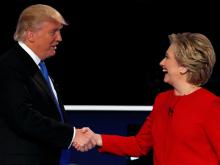
“The presidential nominees will share the dais with Timothy Cardinal Dolan, Archbishop of New York, and they will deliver the evening’s speeches in the spirit of collegiality and good-humor that has become a hallmark of the gala,” said a statement issued Sept. 27 by the New York Archdiocese and the foundation that runs the event.
The Oct. 20 dinner “honors a cause that transcends the polarizing political rhetoric of the day and exemplifies the vision of Gov. Alfred E. Smith, known as ‘The Happy Warrior,’ for his ability to maintain his positive outlook even as he tackled the pressing social issues of his day,” the statement said.

A year later, many evangelical voters have grown to love the Donald’s roller coaster. Just as Trump divided and conquered the Republican Party, so also he has divided and conquered the religious right, the voting bloc of white conservative Christians that has been a cornerstone of the Republican Party’s outreach for decades.

Should Donald Trump’s racist comments, since the inception of his campaign, be morally disqualifying for him to become the president of the United States?
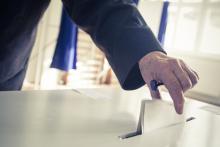
Are voting restrictions about voter fraud, or are they just a ruse to suppress likely Democratic voters?
Since 2010, conservatives have instituted voting restrictions in 21 states, the most well-known of which are laws that require photo IDs at the polls.
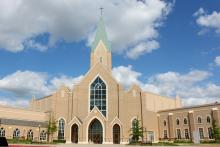
Many people are mystified by “evangelicals.” It’s a word the average nonreligious person doesn’t often hear in the U.S. — except for when it is time to nominate another GOP presidential candidate. Then we hear about who those millions of “evangelicals” are supporting, always under the assumption that all evangelicals are into politics and all will support a Republican.
As an evangelical myself, this is just one of the many misunderstandings of evangelicals that drive me up the wall. It’s a problem I’ve tried to address in several of my books, most recently Evangelical Ethics (Westminster John Knox Press).
Let me take another brief crack at it here. I want to propose that there are four different kinds of evangelicals, or evangelicalism, yielding four very different results.
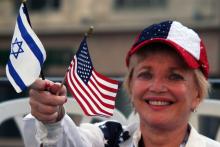
The head of a national Republican Jewish activist group predicted on Nov. 10 that dissatisfaction with the Iran nuclear deal will increase the GOP's share of the Jewish vote in 2016. His Democratic counterpart argued that Jewish Americans, who overwhelmingly vote for his party, are divided over the deal and prioritize other issues.
The debate took place at one of the largest annual gatherings of Jewish activists in the world — the General Assembly of the Jewish Federations of North America — just hours before an address to the group by Israeli Prime Minister Benjamin Netanyahu.
“I say it with a broken heart and a lot of sadness,” said Republican Jewish Coalition Executive Director Matt Brooks on what he alleged is flagging Democratic support for Israel in recent years.
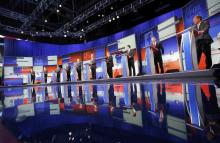
From the multi-station cafeteria to the gift shop to the theater-style sanctuary, worshipers at Prestonwood Baptist Church believe — or hope — that next year’s election will see something new: long-lost evangelical voters.
“So many don’t vote — it just makes me sick,” said Marjoray Wilemon, a retiree from Arlington, Texas, who has seen a lot of politics in her 94 years.
“I hope that some people will realize what kind of bad shape we’re in.”
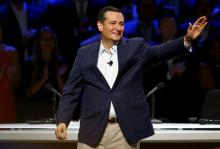
A half-dozen Republican presidential candidates hit all the hot buttons Oct. 18 while speaking to an influential audience: Religious conservatives, the kinds of voters who could decide many GOP primaries next year.
“It’s time for us to bring God back to our country,” retired neurosurgeon Ben Carson told a campaign forum at Prestonwood Baptist Church near Dallas.
From opposition to abortion and gay marriage, to support for Israel and the fight against the Islamic State, Carson and other Republican candidates — Ted Cruz, Jeb Bush, Carly Fiorina, Rick Santorum, and Mike Huckabee — drew repeated ovations at the event co-sponsored by the Faith & Freedom Coalition.

In case you missed it, a strong and militant group of Republican members of Congress have pushed out their caucus leaders, paralyzed the House of Representatives, and can’t seem to find anyone who is as right-wing as they are to be the next Speaker.
These guys — and they are almost all guys; among 36 documented members, only one is a woman — call themselves the Freedom Caucus. And with the exception of one Latino from Utah, the members of this invitation-only group are all white.
The ideology of the Freedom Caucus is far to the right and they want procedural commitments from any new Speaker that would allow them to effectively prevent any compromises with Democrats, and allow them to shut down the government when their extreme demands are not met.
Nothing serves the interests of political parties more than interest groups that use religious rhetoric to promote secular ideologies and add, “Thus saith the Lord.” And Washington is full of them.
American Catholics see how partisan polarization has strained their church and their consciences. Yet unlike religious ideologues of the right and left, they are uneasy with this new development. Neither party offers a platform that stands in solidarity with unborn children, the poor and hungry, undocumented immigrant families, the environment, and people without access to medical care.
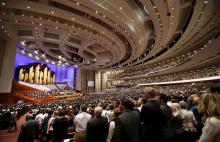
Mormons lean more heavily toward the Republican Party than any other major demographic group — whether clustered by race, age, gender, educational attainment, or religion.
So says a study released April 7 by the Pew Research Center, based on more than 25,000 survey interviews conducted nationwide in 2014.
The survey shows that 70 percent of Mormons lean Republican, compared with just 22 percent who tilt Democratic. That 48-point gap is greater for the GOP than margins provided by any other single group.
Behind Mormons in GOP support are white evangelical Protestants, who give the party a 46-point edge; white Southerners, a 21-point GOP advantage; white men with some college education or less, also 21 points; whites, 9 points; and the “silent generation,” ages 69 to 86, 4 points.
Groups that lean Democratic most heavily are blacks, who give that party a 69-point edge; Asians, a 42-point margin; religiously unaffiliated, 36 points; post-graduate women, 35 points; Jews, 30 percent; Hispanics, 30 points; and the millennial generation, ages 18 to 33, 16 points.
“Obviously, Mormons are one of the strongest groups for Republicans, right on par with white evangelicals. Both groups are about three times as likely to lean towards the Republican Party,” Jocelyn Kiley, associate director of the Pew Research Center, said.
“That’s been the case for a long time.”

The phenomenon of “creeping normality” allows for significant changes to be deemed acceptable when they occur gradually over time, in relatively unnoticed increments, rather than single steps or dramatic and noticeable instances. The “boiling frog” metaphor, which illustrates the familiar account of an unassuming amphibian that is slowly and successfully cooked to death, reveals not only how such instances can occur, but also how a calculated and protracted alteration (produced by those with power to turn up the heat) can possess disastrous results if not noticed and properly countered (by those left in the water). We need not look far for modern-day examples.
Extreme partisanship has crept into our political normality. As revealed last year by the Pew Research Center, our civic temperature is methodically rising, perhaps beyond the boiling point. The study states:
“The overall share of Americans who express consistently conservative or consistently liberal opinions has doubled over the past two decades from 10% to 21%. [As a result], the center has gotten smaller: 39% of Americans currently take a roughly equal number of liberal and conservative positions, down from 49% in surveys conducted in 1994 and 2004.”

I'll never forget the time I was handed a Voting Guide when I walked into church on Sunday morning.
It was 2008 and I was a 23-year-old single woman, attending a large Southern Baptist congregation in Florida for the very first time.
The high school football coach I'd just written a profile on for the front page of the sports section had recommended I attend his church. He was, I'd ascertained, a good man and a genuine Christian. Plus, he and all the other football coaches from the area attended church here. There was the potential of additional scoops, plus an opportunity to make friends - or more - with some of the younger assistant coaches.
It was an impressive campus, all palm trees and white arches. We sang some familiar music, and to be honest, I don't even remember the sermon.
I remember the seemingly harmless Voters Guide. It was 2008. On the second page, listed in alphabetical order, was the man who would become our nation's first black president.
BARRACK OBAMA
It could've been a simple typo, an auto-correct. But as we were all told to bow our heads and pray for awhile to end abortion, I figured out this little Voters Guide might have a slight political agenda. And perhaps that little agenda might have contributed to them not bothering to spell the Democratic candidate's name correctly.
Much as I would have loved going to the church of the football coaches, I couldn't go back after that.

More Americans today say religion’s influence is losing ground just when they want it to play a stronger role in public life and politics.
A new Pew Research Center survey finds 72 percent of Americans say religion’s influence is declining in society — the highest percentage since Pew began measuring the trend in 2001, when only 52 percent held that view.
“Most people (overwhelmingly Christians) view this as a bad thing,” said Greg Smith, associate director of Pew’s Religion & Public Life Project. “That unhappiness may be behind their desire for more religion and politics.”
Growing numbers want their politicians to pray in public and for their clergy to endorse candidates from the pulpit. And nearly half of Americans say business owners with religious objections to gay marriage should to be able to refuse wedding-related services to same-sex couples.
There are three ways to look at the findings, released Sept. 22:

Most Christians don’t approve of President Obama right now, but he gets high ratings from Muslims and other minority religious groups.
It’s not because of their religion, though.
Obama’s level of popular approval matches Americans’ political party ties, not their religious identity, age or almost any other demographic characteristic, said Jeffrey Jones, managing editor of the Gallup poll.
The newest Gallup tracking poll shows the president’s approval rating in June averaged 43 percent for Americans overall. However, his ratings sank with Catholics to 44 percent, down from 54 percent in June 2013.
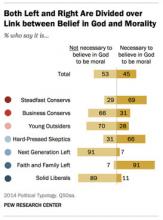
Toss out the party and ideology labels: Republican, Democrat, conservative, liberal.
The Pew Research Center’s new survey, “ Beyond Red VS Blue: The Political Typology,” finds no sharp lines dividing people by their views on politics, faith, family, and the role and limits of government.
“It’s a spectrum,” said Michael Dimock, vice president for research for Pew Research Center.
Looking at questions relating to faith and family, he observed, “the caricature that all religious people are Republican is just not true.”

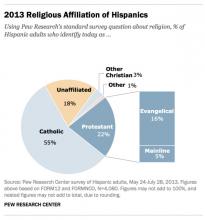
The Pew Research Center’s look at “The Shifting Religious Identity of Latinos in the United States” also examined their beliefs, behavior, and views on social issues. It finds that, beyond the church doors in the lives of the faithful, there are distinct differences between Hispanic evangelicals and Hispanic Catholics:
Catholics are less likely than evangelicals to:
- Attend services weekly — Catholic, 40 percent; evangelical, 71 percent
- Pray daily — Catholic, 61 percent; evangelical, 84 percent
- Take a literal view of the Bible — Catholic, 45 percent; evangelical, 63 percent
- Think abortion should be illegal in all/most cases — Catholic, 54 percent; evangelical, 70 percent
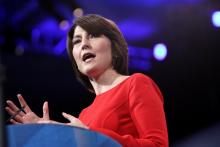
The Republican response to President Obama’s State of the Union speech introduced many Americans to Rep. Cathy McMorris Rodgers. While those of us in Spokane are already familiar with our congresswoman, little is known about her alma mater, Pensacola Christian College.
Study of the Bible is a major concern at PCC, and every student is required to take Bible courses. The treatment of the Bible at PCC is somewhat extreme. The Florida school has a particular (and peculiar) attachment to the King James Version (published in 1611), noting on its website, “it is our practice to use only the Authorized Version [KJV] in the pulpit and in classroom instruction.”
A brief introduction to PCC might help illuminate some of the formative ideas that have shaped the faith and religious views of this rising star within the GOP.

While it's not uncommon to hear the terms "Tea Party" and "libertarian" uttered in the same descriptor, a new survey shows the gap between the two movements. According to the new American Values Survey, an annual release from the Public Religion Research Institute, a full 61 percent of libertarians do not consider themselves part of the Tea Party.
“While conventional wisdom has assumed that the Tea Party movement is fueled by libertarian convictions, most libertarians see themselves as outside of the Tea Party movement. Notably, libertarians are also half as likely as those who identify with the Tea Party movement to see themselves as part of the older Christian right movement," said Dr. Robert P. Jones, CEO of PRRI, in a news release.
In fact, only one in five libertarians claim affiliation with the religious right or conservative Christianity — a claim that more than half of Tea Party adherents would make.